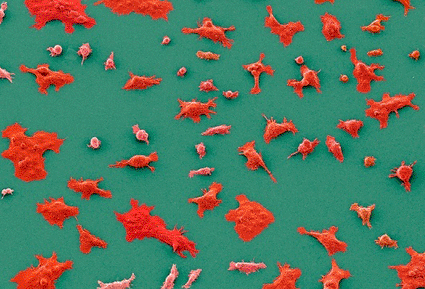Insulin-Like Growth Factor Receptor Inhibitor Shown to Reduce Pancreatic Cancer Growth
By LabMedica International staff writers
Posted on 29 Apr 2009
Researchers are evaluating a fully human monoclonal antibody that suppresses the activity of insulin-like growth factors (IGF-1 and IGF-2) and appears to reduce pancreatic cancer cells in early testing.Posted on 29 Apr 2009
Pancreatic cancer is one of the most lethal cancers, and less than 4% of the 200,000 patients diagnosed yearly live more than five years. The only available clinical treatment is gemcitabine, but this has yet to show a survival benefit.

Image: Colored scanning electron micrograph (SEM) of pancreatic cancer cells (Photo courtesy of Steve Gschmeissner / SPL).
Scientists are testing a variety of experimental therapies to bring pancreatic cancer under control. At Amgen (Thousand Oaks, CA, USA), Pedro J. Beltran, Ph.D., a lead scientist in oncology research, is experimenting with AMG 479, a fully human anti-IGF-1 monoclonal antibody. "We know that insulin-like growth factors play a role in cancer development, particularly in mediating cell survival. This is the first drug that specifically targets the receptor for these growth factors without cross-reacting with the closely related insulin receptor," said Dr. Beltran.
In the in vitro study, AMG 479 bound to IGF-1R and blocked both IGF-1 and IGF-2 binding factors 1 and 2. It also completely inhibited ligand-induced activation in some growth factors, which led to a decreased cellular viability. When Dr. Beltran and colleagues measured the effect of AMG 479 on pancreatic cancer cells in vivo, the inhibition rate was approximately 80% inhibition of tumor growth and receptor expression was observed. "These data clearly show that AMG 479 is a clinical candidate for pancreatic cancer therapy, either alone or in combination with gemcitabine," he said.
According to Dr. Beltran, researchers are currently testing AMG 479 in nine separate phase II studies of various cancer types; he expects the effect will be seen beyond pancreatic cancer.
The study was published in the April 2009 issue of the Molecular Cancer Therapeutics, a journal of the American Association for Cancer Research.
Related Links:
Amgen










 (3) (1).png)


